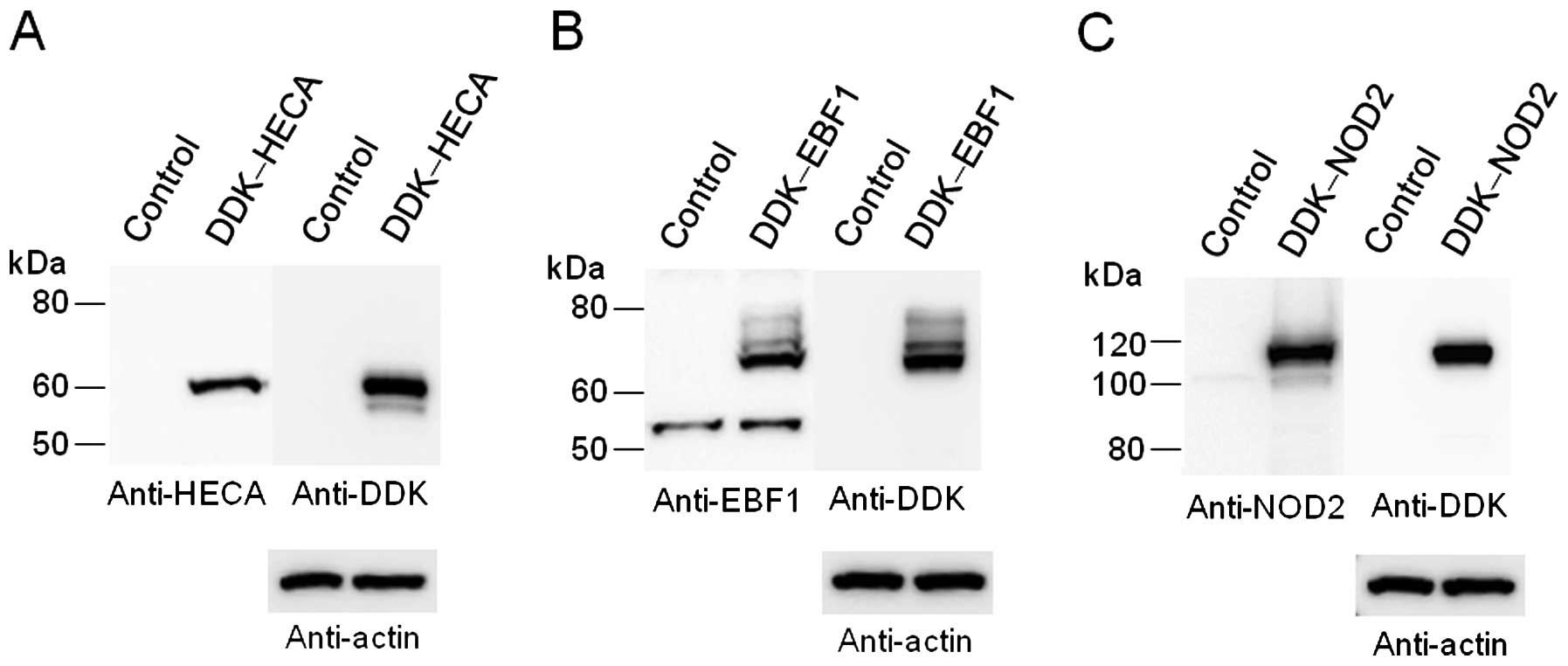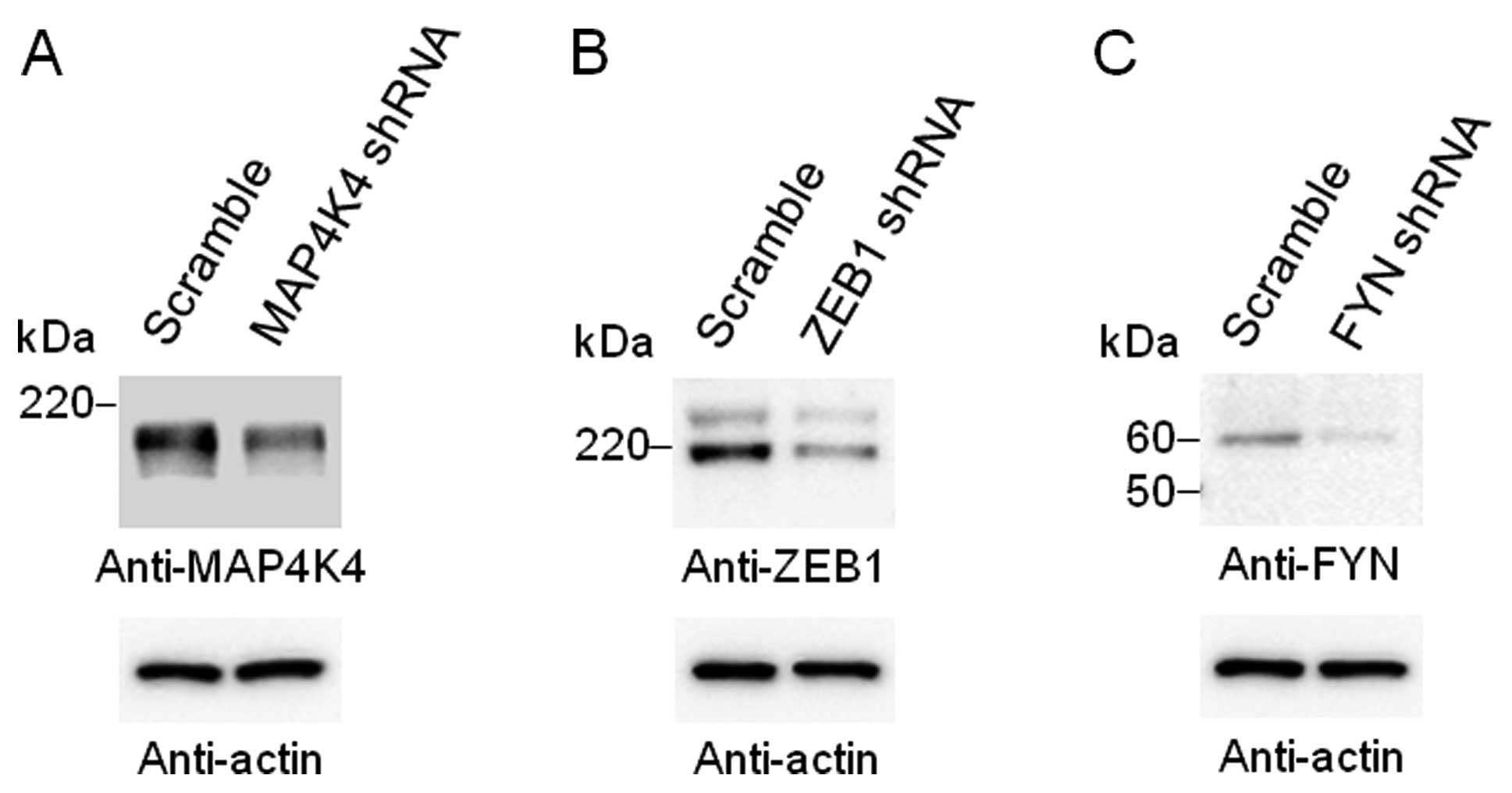|
1
|
Tsai PC, Spector TD and Bell JT: Using
epigenome-wide association scans of DNA methylation in age-related
complex human traits. Epigenomics. 4:511–526. 2012. View Article : Google Scholar : PubMed/NCBI
|
|
2
|
Rakyan VK, Down TA, Balding DJ and Beck S:
Epigenome-wide association studies for common human diseases. Nat
Rev Genet. 12:529–541. 2011. View
Article : Google Scholar : PubMed/NCBI
|
|
3
|
Handy DE, Castro R and Loscalzo J:
Epigenetic modifications: basic mechanisms and role in
cardiovascular disease. Circulation. 123:2145–2156. 2011.
View Article : Google Scholar : PubMed/NCBI
|
|
4
|
Turunen MP, Aavik E and Ylä-Herttuala S:
Epigenetics and atherosclerosis. Biochim Biophys Acta.
1790:886–891. 2009. View Article : Google Scholar : PubMed/NCBI
|
|
5
|
Talens RP, Jukema JW, Trompet S, et al:
Hypermethylation at loci sensitive to the prenatal environment is
associated with increased incidence of myocardial infarction. Int J
Epidemiol. 41:106–115. 2012. View Article : Google Scholar : PubMed/NCBI
|
|
6
|
Castillo-Díaz SA, Garay-Sevilla ME,
Hernández-González MA, Solís-Martínez MO and Zaina S: Extensive
demethylation of normally hypermethylated CpG islands occurs in
human atherosclerotic arteries. Int J Mol Med. 26:691–700.
2010.PubMed/NCBI
|
|
7
|
Bibikova M, Barnes B, Tsan C, et al: High
density DNA methylation array with single CpG site resolution.
Genomics. 98:288–295. 2011. View Article : Google Scholar : PubMed/NCBI
|
|
8
|
Sandoval J, Heyn H, Moran S, et al:
Validation of a DNA methylation microarray for 450,000 CpG sites in
the human genome. Epigenetics. 6:692–702. 2011. View Article : Google Scholar : PubMed/NCBI
|
|
9
|
Durocher Y, Perret S and Kamen A:
High-level and high-throughput recombinant protein production by
transient transfection of suspension-growing human 293-EBNA1 cells.
Nucleic Acids Res. 30:E92002. View Article : Google Scholar
|
|
10
|
Hägg S, Skogsberg J, Lundström J, et al:
Multi-organ expression profiling uncovers a gene module in coronary
artery disease involving transendothelial migration of leukocytes
and LIM domain binding 2: the Stockholm Atherosclerosis Gene
Expression (STAGE) study. PLoS Genet. 5:e10007542009.
|
|
11
|
Nolan DK, Sutton B, Haynes C, et al: Fine
mapping of a linkage peak with integration of lipid traits
identifies novel coronary artery disease genes on chromosome 5. BMC
Genet. 13:122012. View Article : Google Scholar : PubMed/NCBI
|
|
12
|
Galluzzo S, Patti G, Dicuonzo G, et al:
Association between NOD2/CARD15 polymorphisms and coronary artery
disease: a case-control study. Hum Immunol. 72:636–640. 2011.
View Article : Google Scholar : PubMed/NCBI
|
|
13
|
Miller VM, Petterson TM, Jeavons EN, et
al: Genetic polymorphisms associated with carotid artery
intima-media thickness and coronary artery calcification in women
of the Kronos Early Estrogen Prevention Study. Physiol Genomics.
45:79–88. 2013. View Article : Google Scholar
|
|
14
|
Reddy MA, Jin W, Villeneuve L, et al:
Pro-inflammatory role of microRNA-200 in vascular smooth muscle
cells from diabetic mice. Arterioscler Thromb Vasc Biol.
32:721–729. 2012. View Article : Google Scholar : PubMed/NCBI
|
|
15
|
Chen K, Li W, Major J, Rahaman SO,
Febbraio M and Silverstein RL: Vav guanine nucleotide exchange
factors link hyperlipidemia and a prothrombotic state. Blood.
117:5744–5750. 2011. View Article : Google Scholar : PubMed/NCBI
|
|
16
|
Dowejko A, Bauer RJ, Müller-Richter UD and
Reichert TE: The human homolog of the Drosophila headcase
protein slows down cell division of head and neck cancer cells.
Carcinogenesis. 30:1678–1685. 2009.PubMed/NCBI
|
|
17
|
Fantidis P: The role of intracellular
3′5′-cyclic adenosine monophosphate (cAMP) in atherosclerosis. Curr
Vasc Pharmacol. 8:464–472. 2010.
|
|
18
|
CARDIoGRAMplusC4D Consortium. Deloukas P,
Kanoni S, Willenborg C, et al: Large-scale association analysis
identifies new risk loci for coronary artery disease. Nat Genet.
45:25–33. 2013. View Article : Google Scholar : PubMed/NCBI
|
|
19
|
Lukin K, Fields S, Hartley J and Hagman J:
Early B cell factor: regulator of B lineage specification and
commitment. Semin Immunol. 20:221–227. 2008. View Article : Google Scholar
|
|
20
|
Fretz JA, Nelson T, Xi Y, Adams DJ, Rosen
CJ and Horowitz MC: Altered metabolism and lipodystrophy in the
early B-cell factor 1-deficient mouse. Endocrinology.
151:1611–1621. 2010. View Article : Google Scholar : PubMed/NCBI
|
|
21
|
Akerblad P, Lind U, Liberg D, Bamberg K
and Sigvardsson M: Early B-cell factor (O/E-1) is a promoter of
adipogenesis and involved in control of genes important for
terminal adipocyte differentiation. Mol Cell Biol. 22:8015–8025.
2002. View Article : Google Scholar : PubMed/NCBI
|
|
22
|
Opitz B, Förster S, Hocke AC, et al:
Nod1-mediated endothelial cell activation by Chlamydophila
pneumoniae. Circ Res. 96:319–326. 2005. View Article : Google Scholar : PubMed/NCBI
|
|
23
|
Girardin SE, Boneca IG, Viala J, et al:
Nod2 is a general sensor of peptidoglycan through muramyl dipeptide
(MDP) detection. J Biol Chem. 278:8869–8872. 2003. View Article : Google Scholar : PubMed/NCBI
|
|
24
|
Inohara N, Koseki T, Lin J, et al: An
induced proximity model for NF-kappa B activation in the Nod1/RICK
and RIP signaling pathways. J Biol Chem. 275:27823–27831.
2000.PubMed/NCBI
|
|
25
|
Collins T and Cybulsky MI: NF-κB: pivotal
mediator or innocent bystander in atherogenesis? J Clin Invest.
107:255–264. 2001.
|
|
26
|
Vandewalle C, Van Roy F and Berx G: The
role of the ZEB family of transcription factors in development and
disease. Cell Mol Life Sci. 66:773–787. 2009. View Article : Google Scholar : PubMed/NCBI
|
|
27
|
Davies MN, Volta M, Pidsley R, et al:
Functional annotation of the human brain methylome identifies
tissue-specific epigenetic variation across brain and blood. Genome
Biol. 13:R432012. View Article : Google Scholar : PubMed/NCBI
|
|
28
|
Christensen BC, Houseman EA, Marsit CJ, et
al: Aging and environmental exposures alter tissue-specific DNA
methylation dependent upon CpG island context. PLoS Genet.
5:e10006022009. View Article : Google Scholar : PubMed/NCBI
|
|
29
|
Bell JT, Pai AA, Pickrell JK, et al: DNA
methylation patterns associate with genetic and gene expression
variation in HapMap cell lines. Genome Biol. 12:R102011. View Article : Google Scholar : PubMed/NCBI
|
















